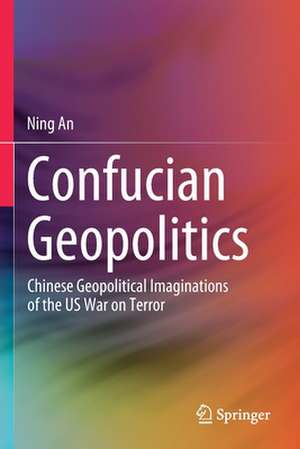Confucian Geopolitics: Chinese Geopolitical Imaginations of the US War on Terror
Autor Ning Anen Limba Engleză Paperback – 2 ian 2021
This book presents an essential non-western geopolitical landscape and draws on the conceptual framework of critical geopolitics to discuss the views on terrorism held by various groups of Chinese people, including the elite, middle class, and masses. After investigating these views, the book posits that these Chinese geopolitical imaginaries cannot be fully understood using the extant geopolitical theories, including communism, nationalism, and realism.
Accordingly, it subsequently seeks to adapt the Confucian geopolitical idea in order to theorize Chinese geopolitics. By doing so, the book reintroduces the historically embedded but long-ignored traditional Chinese political geography philosophies (in particular Confucian thinking) into efforts to explain Chinese geopolitics. In this regard, it promotes a specific and importantly Confucianism-based understanding of international security politics. The geopolitical model provided can also help to explain Chinese views on other major geopolitical issues.
| Toate formatele și edițiile | Preț | Express |
|---|---|---|
| Paperback (1) | 382.75 lei 6-8 săpt. | |
| Springer Nature Singapore – 2 ian 2021 | 382.75 lei 6-8 săpt. | |
| Hardback (1) | 390.08 lei 6-8 săpt. | |
| Springer Nature Singapore – 2 ian 2020 | 390.08 lei 6-8 săpt. |
Preț: 382.75 lei
Nou
Puncte Express: 574
Preț estimativ în valută:
73.24€ • 78.32$ • 61.07£
73.24€ • 78.32$ • 61.07£
Carte tipărită la comandă
Livrare economică 17 aprilie-01 mai
Preluare comenzi: 021 569.72.76
Specificații
ISBN-13: 9789811520129
ISBN-10: 9811520127
Pagini: 183
Ilustrații: XVII, 183 p. 6 illus., 1 illus. in color.
Dimensiuni: 155 x 235 mm
Greutate: 0.29 kg
Ediția:1st ed. 2020
Editura: Springer Nature Singapore
Colecția Springer
Locul publicării:Singapore, Singapore
ISBN-10: 9811520127
Pagini: 183
Ilustrații: XVII, 183 p. 6 illus., 1 illus. in color.
Dimensiuni: 155 x 235 mm
Greutate: 0.29 kg
Ediția:1st ed. 2020
Editura: Springer Nature Singapore
Colecția Springer
Locul publicării:Singapore, Singapore
Cuprins
Chapter 1. Introduction.- Chapter 2. Critical geopolitics.- Chapter 3. Confucianism, Chinese geopolitics and terrorism.- Chapter 4. Methodology.- Chapter 5. Chinese discourses of terrorism: a geopolitical analysis of Chinese newspapers.- Chapter 6. Reading terrorism and the US in Chinese newspapers: a geopolitical analysis of audience imaginations.- Chapter 7. Geopolitical visions from the mass Chinese? Internet discourses of terrorism and the US.- Chapter 8. Conclusions.
Textul de pe ultima copertă
This book presents an essential non-western geopolitical landscape and draws on the conceptual framework of critical geopolitics to discuss the views on terrorism held by various groups of Chinese people, including the elite, middle class, and masses. After investigating these views, the book posits that these Chinese geopolitical imaginaries cannot be fully understood using the extant geopolitical theories, including communism, nationalism, and realism.
Accordingly, it subsequently seeks to adapt the Confucian geopolitical idea in order to theorize Chinese geopolitics. By doing so, the book reintroduces the historically embedded but long-ignored traditional Chinese political geography philosophies (in particular Confucian thinking) into efforts to explain Chinese geopolitics. In this regard, it promotes a specific and importantly Confucianism-based understanding of international security politics. The geopolitical model provided can also help to explain Chinese views on other major geopolitical issues.
Caracteristici
Argues for a Chinese-style geopolitical tradition Breaks with the US orthodoxy, which is based on a binary understanding of terrorism Merges Orientalism with Chinese geopolitical imaginaries
